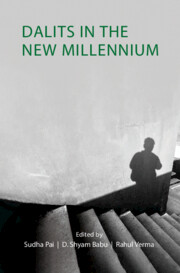Book contents
- Frontmatter
- Contents
- List of Figures
- List of Tables
- Acknowledgements
- 1 Introduction: Dalit Discourse in the New Millennium
- Part I Shifting Patterns of Electoral Politics
- 2 Voting Patterns among Dalits since the 1990s
- 3 On the Peculiar Absence of Dalit Politics: Punjab and West Bengal
- 4 Decline of the Bahujan Samaj Party: Dalit Politics under Right-Wing Hegemony
- 5 A Democratic Dilemma: Dalit Parties, Campaign Finance, and Coalition Politics
- 6 Why Are More Dalits Voting for the Bharatiya Janata Party since 2014?
- Part II Popular Culture, Discourse, and Protest
- Part III Transformations in Ideology and Identity
- Part IV Aspirations and Anxieties
- Part V Discrimination and Representation
- About the Contributors
- Index
4 - Decline of the Bahujan Samaj Party: Dalit Politics under Right-Wing Hegemony
from Part I - Shifting Patterns of Electoral Politics
Published online by Cambridge University Press: 12 July 2023
- Frontmatter
- Contents
- List of Figures
- List of Tables
- Acknowledgements
- 1 Introduction: Dalit Discourse in the New Millennium
- Part I Shifting Patterns of Electoral Politics
- 2 Voting Patterns among Dalits since the 1990s
- 3 On the Peculiar Absence of Dalit Politics: Punjab and West Bengal
- 4 Decline of the Bahujan Samaj Party: Dalit Politics under Right-Wing Hegemony
- 5 A Democratic Dilemma: Dalit Parties, Campaign Finance, and Coalition Politics
- 6 Why Are More Dalits Voting for the Bharatiya Janata Party since 2014?
- Part II Popular Culture, Discourse, and Protest
- Part III Transformations in Ideology and Identity
- Part IV Aspirations and Anxieties
- Part V Discrimination and Representation
- About the Contributors
- Index
Summary
The Dalit movement in the country is at a turning point today. Dalit parties are in electoral decline, with a substantial section of Dalits having moved towards non-Dalit parties, particularly the Bharatiya Janata Party (BJP). Uttar Pradesh (UP) provides an important site for the study of this phenomenon as it is a key state where Dalit assertion led to the formation of a strong Dalit party, the Bahujan Samaj Party (BSP), which has shaped national politics over the last few decades. Also, UP is the state from where two strong leaders – Mayawati and Narendra Modi – have influenced Dalit politics in the Hindi heartland in the new millennium.
In the 1990s, the success of the BSP under the leadership of Mayawati lay in harnessing the desire for self-respect and dignity among Dalits into a strong party. By the mid-1990s, she was able to consolidate the various sub-castes, insofar as voting was concerned, behind the BSP and emerge as a notable Dalit leader. These developments enabled Mayawati to move beyond her core constituency and form the Sarvajan alliance in 2007, which helped her gain a majority in the assembly elections. But the success of the BSP proved to be short-lived. Defeated in the 2012 assembly elections, it has experienced swift decline, following the revival of the BJP in UP. The BSP failed to win even a single seat in the Lok Sabha elections in 2014, won 19 seats in the 2017 assembly elections, and 10 seats in the 2019 Lok Sabha elections, though it managed to gain around 20 per cent of the votes each time (Election Commission of India [ECI], 2014, 2017, 2019). In the 2022 assembly elections, the party obtained only one seat in the Rasara constituency in Ballia district of eastern UP. It obtained just 12.9 per cent of the vote, which was its lowest since 1989, when it gained 9.46 percent of the vote but had managed to gain 13 seats.
Following the BSP's defeat in 2012, when Dalits began to actively search for an alternative, Modi was able to take advantage of these shifts and attract a section of Dalits in the 2014 national elections.
- Type
- Chapter
- Information
- Dalits in the New Millennium , pp. 59 - 77Publisher: Cambridge University PressPrint publication year: 2023



